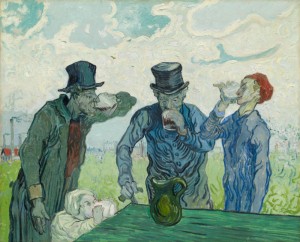
“The Drinkers” Vincent van Gogh Dutch, 1853–1890
Terroir is simply, how the geological factors that wine grapes, or any other food is cultivated from, give that food an accent of the land, and the place it was grown. This includes soil makeup, climate, sunlight and all other environmental factors.
Terroir is complicatedly, everything that you can taste physically and emotionally in the wine. I, as well as others, would argue that even external factors like the ethics, principles, attention to detail, and philosophical approaches can truly enhance or mask a wine’s appeal.
Terroir is the expression of the land. This can be good or bad I’d say. Something can have a bad terroir, possibly because it shouldn’t be grown there in the first place. When something is grown outside of it’s growing climate there has to be an increase of human manipulation. At first I thought this would clearly be a decrease of Terroir, however I don’t actually think that is always the case. Humans are agricultural geniuses, enhancing maybe a more subtle aspect of the land, to bring to attention to it and appreciate it. I’m sort of torn here but ultimately terroir has to be associated with humans. We obviously thought it was important enough to have a word for it, and our involvement in it is unavoidable. Maybe a more accurate definition of terroir is, human’s using their knowledge of agriculture and taste to express a land the best we can?
So, how can one place have more “terroir” than another place?
This would have to do with distinctiveness within terrains. Wine grapes grown in flint heavy soils can be said to have a “smokiness” about them that make them unique from other wines that don’t have something truly special about their soil or climate.
Terroir isn’t strictly science though, and to only describe this word with geological factors doesn’t quite get at what this word means. Terroir celebrates the taste of a place, what that land can grow, and how that can be expressed through and through in the flavor. As we know all of this food must be managed in some way, but there are decisions to be made about what will celebrate and enhance the accent of the place, and different combinations of those decisions is where we get distinctiveness’ in wine, and the place those grapes were cultivated.
Can we really apply terroir to wines that have no goal of terroir? Or does that miss the point of terroir completely?
Terroir is very simply defined by western cultures as “climate” and this is not true at all at to make matters worse, when this science cannot be proven we think of terroir as being dis proven when actually, it is our definition that is being sis proven.
We do not have anything even close to a word that ties man to soil as strongly as terroir can. This may point to how we see our relationship to the earth, which is not a common subject in our part of the world. Other languages have something along the same lines as terroir– this language can be used to determine the value of things to societies, or lack there of.
Leave a Reply